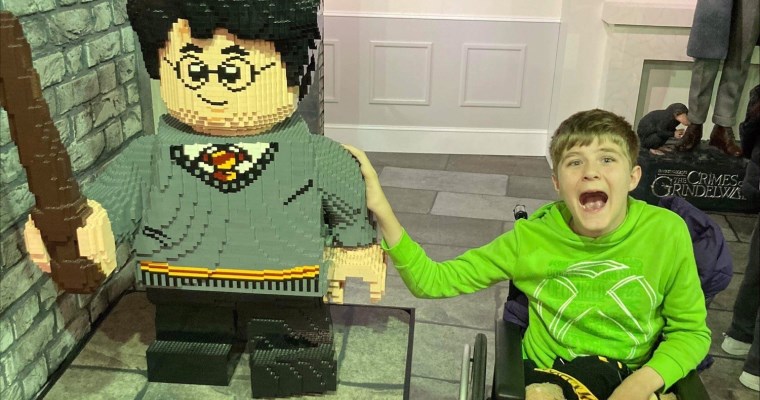
Category: Ataxia UK
Posted on 04.09.2023
The ataxias are a set of life-limiting neurological conditions that disrupts the messages sent from our brains to our muscles. Not just the muscles we use to move, but those we use to speak, listen and see. Over time, people with ataxia are slowly imprisoned in their own bodies, losing the tools they once had to communicate with loved ones. Over 200 different genetic ataxias have been discovered in the past 30 years, each of which requires a different treatment. Currently, no treatments or cures for most of the ataxias have been found. Ataxia UK is the leading national charity which supports those affected ataxia and funds research into finding treatments and cures.
The most common and aggressive form of the condition is Friedreich’s ataxia (FA), which predominantly shows its symptoms during childhood or early puberty. The earlier FA begins to show, the likelihood is the faster it progresses. It hampers a child/young person’s balance, mobility and movement, before causing speech, hearing and vision to deteriorate and, eventually, weakens the heart. As a result, children diagnosed with FA usually have a shorter life expectancy than their peers and will spend much of their life in a wheelchair.
As with the other ataxias, there is no cure for FA.
A major part of our work is to support and advise parents of children who have FA, whilst funding research into treatments and a cure. The support we receive from Childlife is essential in achieving this: it enables us to run local support groups, conferences, various online forums and information sessions to reduce families’ isolation and help them understand the condition.
Some key highlights from FY 2022-23
- The financial year 2022-23 ended on an absolute high with the approval of Skyclarys by the FDA in February 2023, marking a major milestone for the ataxia community and Ataxia UK as Skyclarys is the first drug licensed for the treatment of Friedreich’s Ataxia (FA). This approval offers new hope to those living with FA, and represents a significant step forward in the search for effective treatments.
- Although the approval of Skyclarys in the US is cause for celebration, the struggle for access to this treatment in the UK is ongoing. At present, there has been no application for approval in the UK, but we are hopeful that this is only a matter of time. Moreover, the pace of ataxia research is speeding up, with a number of trials un

- Ataxia UK is committed to doing everything it can to support the approval of Skyclarys and any other prospective treatments for the ataxias. We know it’s hard to be patient when it feels treatments are around the corner, but we hope that patience will be rewarded before too long. In the meanwhile Ataxia UK will do everything it can to support the approval of Skyclarys and any other prospective treatments for the ataxias.
Other highlights:
- EFACTS: The European Friedreich’s ataxia Consortium for Translational Studies (EFACTS) is a study originally funded by the European Commission that is gathering vital information about the progression of Friedreich’s ataxia (FA). Ataxia UK has supported the project over the years, and data from this study has resulted in useful publications and is also being used to plan clinical trials.
- FA Global Clinical Consortium: During the year, efforts have progressed in combining the efforts of EFACTS with the other well-established natural history study in Friedreich ataxia, FACOMS. The investigators of both FACOMS and EFACTS see the need to combine efforts into a single global consortium with a unified natural history and clinical research infrastructure. The new FA Global Clinical Consortium and a harmonized global study protocol has now been established, and Ataxia UK has a patient group representative on this Consortium.
- During the past year, Ataxia UK has made significant strides in improving care and support for individuals with ataxia, particularly in the paediatric population. Two new paediatric ataxia centres were established, one at the London Ataxia Centre and the other at the John Radcliffe Hospital in Oxford. The London Ataxia Centre launched its Paediatric Ataxia Clinic, which provides a new service for children with ataxia to receive care at a centre of excellence. Led by Professor Paola Giunti, the clinic team also includes Dr Shpresa Pula and Katarina Manso. The clinic leads a large translational research programme, primarily focused on the genetic basis of ataxias, particularly Friedreich’s ataxia, and accepts referrals for children aged 8-18. Ataxia UK has provided part-funding for the Ataxia Specialist nurse to support the clinic. The John Radcliffe Hospital in Oxford was accredited by Ataxia UK as a Specialist Ataxia Centre, where people with ataxia can receive the best quality of care from ataxia experts. The Oxford Ataxia Centre offers a specialised service for both adults and children with ataxia, with a team consisting of two adult neurologists, a clinical geneticist, and a paediatric neurologist.
Scientific research into treatment and cures and the support made available to those affected by ataxia whilst we wait for a cure, is sustained by Childlife supporters. On behalf of everyone affected by ataxia and us at all at Ataxia UK, Thank you.
Dan is Head of Fundraising and Communications at Childlife member charity, Ataxia UK.



